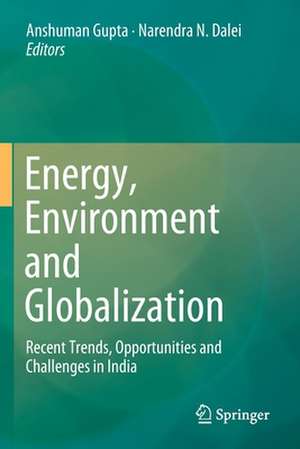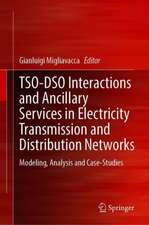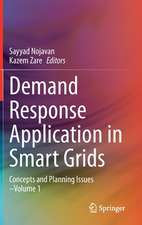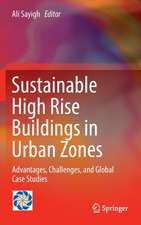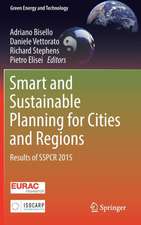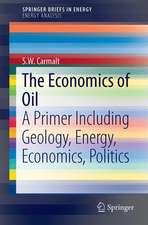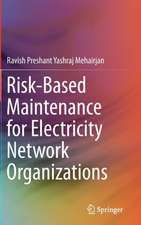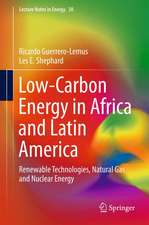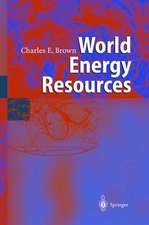Energy, Environment and Globalization: Recent Trends, Opportunities and Challenges in India
Editat de Anshuman Gupta, Narendra N. Daleien Limba Engleză Paperback – 21 aug 2020
The book argues that globalization need not have only a negative environmental impact; it can also have positive impact through the importation of environmentally sound technologies and implementing global compliance standards. The book is divided into three sections: The energy section discusses issues relating to the status of Indian natural gas market and the need for developing an efficient gasmarket in India; the economics and politics of sustainable energy in India; the challenges of thermal power and significance of clean thermal power generation in India; environmental and policy issues concerning energy use in urban India; the importance of energy use in developing Human Development Index (HDI); and issues relating to renewable energy in India. The environment section then examines topics such as the impact of global warming on local weather by examining the frequency of extreme weather events such as drought and floods, and their impact on farming activities in the Indian state of Odisha; the importance of according the economic value to environmentally significant things like national park , mangroves, etc. for sustainable development; the role of environmental accounting for ecological sustainability and ecotourism; and environmental concerns increasingly gaining traction among the corporate sector for their long-run benefits . Lastly, the third section addresses issues relating to the challenges and opportunities of globalization, such as the interface between globalization and environment; managing India’s business interest in proposing new Bilateral Investment Treaty (BIT); the challenges being faced by Indian exports and their revival; and making Indian SMEs competitive. As such, it is an invaluable resource for policymakers, researchers, practitioners and students in the field of energy, environment and trade economics.
| Toate formatele și edițiile | Preț | Express |
|---|---|---|
| Paperback (1) | 585.40 lei 6-8 săpt. | |
| Springer Nature Singapore – 21 aug 2020 | 585.40 lei 6-8 săpt. | |
| Hardback (1) | 734.27 lei 6-8 săpt. | |
| Springer Nature Singapore – 21 aug 2019 | 734.27 lei 6-8 săpt. |
Preț: 585.40 lei
Preț vechi: 688.71 lei
-15% Nou
Puncte Express: 878
Preț estimativ în valută:
112.01€ • 116.95$ • 92.71£
112.01€ • 116.95$ • 92.71£
Carte tipărită la comandă
Livrare economică 05-19 aprilie
Preluare comenzi: 021 569.72.76
Specificații
ISBN-13: 9789811393129
ISBN-10: 9811393125
Pagini: 306
Ilustrații: XX, 306 p. 75 illus., 66 illus. in color.
Dimensiuni: 155 x 235 mm
Greutate: 0.46 kg
Ediția:1st ed. 2020
Editura: Springer Nature Singapore
Colecția Springer
Locul publicării:Singapore, Singapore
ISBN-10: 9811393125
Pagini: 306
Ilustrații: XX, 306 p. 75 illus., 66 illus. in color.
Dimensiuni: 155 x 235 mm
Greutate: 0.46 kg
Ediția:1st ed. 2020
Editura: Springer Nature Singapore
Colecția Springer
Locul publicării:Singapore, Singapore
Cuprins
Energy, Environment and Globalization: An Interface.- India's Crude Oil Consumption: Empirical Estimations and Future Projections.- Clean Thermal Power Generation: A Win-Win Situation.- Urbanization in India in the Globalized Era: Revisiting the Energy Aspect and Policy Issues.- Indian Gas Market - Roadmap for Creation of an Efficient Gas Market.- 100% Rural Electrification in India: Myth or Reality?.- Empirical Relation between Energy Use and Human Development: Evidence from BRICS Nations.- Empirical Nexus between Global Temperature, Local Weather and Agriculture: Evidence from the Indian State of Odisha.- Evaluation of Mangrove Ecosystem Services: Methodological and Data Challenges.- Urbanization, urban sprawl and environment in Dehradun.- Mining displacements and Rehabilitation & Resettlement process in Mahanadi Coalfields Limited: An Empirical Investigation.- Economic Valuation of Dachigam National Park: an Operational Tool for Sustainable Development.- Community Attitude towards Environmental Accounting: Special Focus on Ecotourism Destinations.- Modelling the critical factors of green supply chain management under fuzzy environment.- The New BIT**: Is it a Game of Equals?.- Exports Dynamics of India: A Cointegration Analysis.- Making Micro, Small and Medium Enterprises Competitive: Cluster Development Methodology.- Foreign Direct Investment in Infrastructure: Evidences from Indian Economy.
Notă biografică
Anshuman Gupta is Professor and Head of the Economics Department at the School of Business, University of Petroleum and Energy Studies (UPES), Dehradun, India. After receiving his Ph.D. from Jawaharlal Nehru University (JNU), he served as an economist at the Associated Chamber of Commerce and Industry of India (ASSOCHAM). He has worked at Hawassa University, Ethiopia, under the UNDP/World Bank-funded capacity development program. Before joining UPES, he worked at the Research and Information System (RIS) for Developing Countries, a New Delhi-based autonomous policy research institute. His research interests include international trade, regional trading blocs, WTO issues, environmental and energy issues, etc. He has completed several government-funded projects and published numerous scholarly books and research papers in national and international journals. He also contributes in national newspapers including The Economic Times and Business Standard.
Narendra N. Dalei is Assistant Professor and Programme Head of Energy Economics (UG Programme) at the School of Business, University of Petroleum and Energy Studies (UPES), Dehradun, India. Before joining UPES, he held various research and teaching positions at the University of Delhi, IGNOU and the Ministry of Statistics and Programme Implementation, Government of India. He obtained his Ph.D. in Ecological and Resource Economics from the University of Delhi. His research focuses on the interactions between energy, environment and climate change in the context of India and the rest of the world. He has published numerous research papers in peer-reviewed journals, such as the Journal of Quantitative Economics (Springer), Journal of Air Transport Management (Elsevier), Economics and Policy of Energy and Environment (FrancoAngeli), International Journal of Ecological Economics and Statistics (CESER) and Utilities Policy ( Elsevier).
Narendra N. Dalei is Assistant Professor and Programme Head of Energy Economics (UG Programme) at the School of Business, University of Petroleum and Energy Studies (UPES), Dehradun, India. Before joining UPES, he held various research and teaching positions at the University of Delhi, IGNOU and the Ministry of Statistics and Programme Implementation, Government of India. He obtained his Ph.D. in Ecological and Resource Economics from the University of Delhi. His research focuses on the interactions between energy, environment and climate change in the context of India and the rest of the world. He has published numerous research papers in peer-reviewed journals, such as the Journal of Quantitative Economics (Springer), Journal of Air Transport Management (Elsevier), Economics and Policy of Energy and Environment (FrancoAngeli), International Journal of Ecological Economics and Statistics (CESER) and Utilities Policy ( Elsevier).
Textul de pe ultima copertă
This book analyzes contemporary issues relating to energy, environment, and globalization in the Indian context. As a signatory to the Paris climate accord, India has reiterated its commitment to taking strong and positive steps toward climate change mitigation. However, as one of the fastest growing economies in the world, it is battling the effects of a steep rise in fossil fuel usage and pollution. Further, increasing globalization is leading to greater economic activity and production, resulting in additional energy use, which has a negative effect on the environment.The book argues that globalization need not have only a negative environmental impact; it can also have positive impact through the importation of environmentally sound technologies and implementing global compliance standards. The book is divided into three sections: The energy section discusses issues relating to the status of Indian natural gas market and the need for developing an efficient gas market inIndia; the economics and politics of sustainable energy in India; the challenges of thermal power and significance of clean thermal power generation in India; environmental and policy issues concerning energy use in urban India; the importance of energy use in developing Human Development Index (HDI); and issues relating to renewable energy in India. The environment section then examines topics such as the impact of global warming on local weather by examining the frequency of extreme weather events such as drought and floods, and their impact on farming activities in the Indian state of Odisha; the importance of according the economic value to environmentally significant things like national park , mangroves, etc. for sustainable development; the role of environmental accounting for ecological sustainability and ecotourism; and environmental concerns increasingly gaining traction among the corporate sector for their long-run benefits . Lastly, the third section addresses issuesrelating to the challenges and opportunities of globalization, such as the interface between globalization and environment; managing India’s business interest in proposing new Bilateral Investment Treaty (BIT); the challenges being faced by Indian exports and their revival; and making Indian SMEs competitive. As such, it is an invaluable resource for policymakers, researchers, practitioners and students in the field of energy, environment and trade economics.
Caracteristici
Presents a robust analysis of the contemporary trends, challenges, and opportunities in the inter-related areas of energy, environment and globalization, offering new and unorthodox insights that reflect the wide experience and wisdom of academic and industry experts from India Provides convincing conclusions and arguments toward the formulation of feasible strategies that address various problems being faced by India as a fallout of haphazard and energy-intensive development Offers suggestions for effective energy policies to help India meet its growing energy demands while keeping in mind environmental and growth aspects
